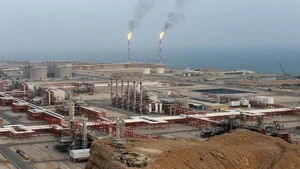Brent fell more than 1 USD after the deal was reported, trading below 70 USD a barrel, well off October's three-year highs above 86 USD. Prices in November had already registered their biggest monthly decline since the start of the pandemic.
Under its existing pact, OPEC+ agreed to raise output by 400,000 bpd each month, winding down record cuts agreed in 2020 when demand crashed because of the pandemic.
The agreement to stick to that pact and to add 400,000 bpd in January, confirmed by a draft OPEC+ statement and OPEC+ sources, sent prices below 67 USD before they recovered some ground.
The Organization of the Petroleum Exporting Countries and its allies, known as OPEC+, have been resisting US requests for speedier increases in oil output to help the global economy, fearing oversupply could hurt a fragile energy sector recovery.
Washington repeatedly asked OPEC to pump more as US gasoline prices soared and President Joe Biden's approval ratings slid.
Before the meeting sources said market uncertainties had prompted the group to consider options such as pausing the planned January increase or raising output by a smaller amount.
Even before concerns about Omicron emerged, OPEC+ had been weighing the effects of last week's announcement by the United States and other major consumers that they would release emergency crude reserves to temper energy prices.
Any decision to hike output by less than 400,000 bpd in January or even cutting supplies would have put OPEC in full confrontation with Washington amid already tepid relations between the United States and OPEC's leader Saudi Arabia.
OPEC+ experts said in a report seen by Reuters on Wednesday that the impact from Omicron was not yet clear, even though many countries were introducing lockdowns and other restrictions.
Biden's administration could still adjust the timing of any release of reserves if prices dropped substantially, US Deputy Energy Secretary David Turk said on Wednesday.
Last year OPEC+ made record output cuts of 10 million bpd, equivalent to about 10% of global supply. That has since been scaled back to about 3.8 million bpd.
However, OPEC+ has regularly failed to meet its output targets, producing about 700,000 bpd less than planned in both September and October, the International Energy Agency (IEA) says.
















